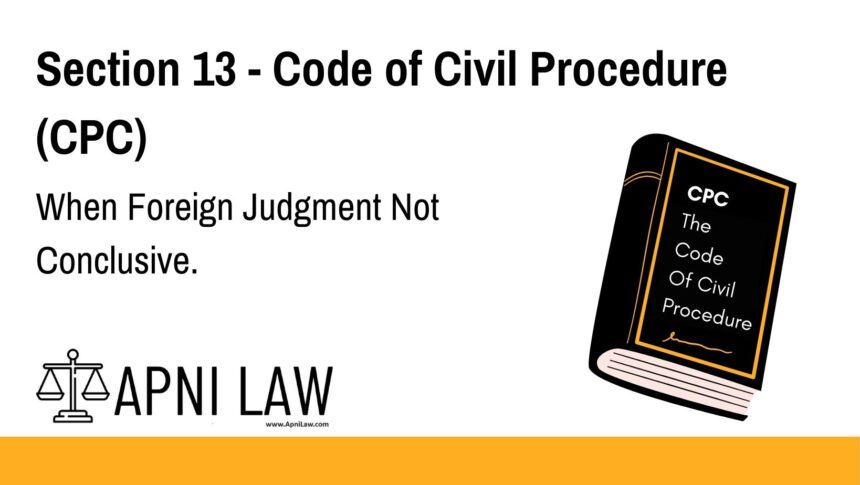Code
A foreign judgment shall be conclusive as to any matter thereby directly adjudicated upon between the same parties or between parties under whom they or any of them claim litigating under the same title except—
(a) where it has not been pronounced by a Court of competent jurisdiction;
(b) where it has not been given on the merits of the case;
(c) where it appears on the face of the proceedings to be founded on an incorrect view of international law or a refusal to recognise the law of India in cases in which such law is applicable;
(d) where the proceedings in which the judgment was obtained are opposed to natural justice;
(e) where it has been obtained by fraud;
(f) where it sustains a claim founded on a breach of any law in force in India.
Explanation of Section 13 CPC
Section 13 of the CPC lays down the rule regarding the conclusiveness of foreign judgments in Indian courts. A foreign judgment is generally considered final and binding in India regarding any matter that has been directly adjudicated upon. However, this conclusiveness is subject to specific exceptions. These exceptions are meant to protect the Indian legal system from accepting judgments that violate basic principles of justice, fairness, or public policy.
In essence, Section 13 creates a balance between international comity (mutual respect for judicial decisions between nations) and the sovereignty and integrity of Indian law.
The six exceptions listed under Section 13 ensure that Indian courts will not accept or enforce foreign judgments if they:
- Are from a court lacking proper jurisdiction
- Do not address the case on its merits
- Contradict Indian or international law
- Violate natural justice
- Are procured by fraud
- Are based on actions that violate Indian law
These safeguards are crucial, especially in cross-border litigation, business disputes, family law (like foreign divorce decrees), and enforcement of foreign awards.
Illustration of Section 13 CPC
Example 1:
A U.S. court passes a divorce decree between an Indian couple. The wife was not given a fair chance to be heard (no notice served), and the decision was given ex parte without examining her claims.
In this case, the Indian courts may refuse to accept the decree as binding because it violates principles of natural justice (exception d).
Example 2:
A UK court delivers a judgment in a contract suit against an Indian company. The judgment was based on UK laws despite the contract being governed by Indian law as agreed upon.
Here, the judgment may be challenged under clause (c) – refusal to recognize applicable Indian law.
Common Questions Asked
Q1. Is a foreign judgment automatically enforceable in India?
No. A foreign judgment must meet the criteria of Section 13 CPC. If it does not fall under any of the six exceptions, it may be enforced under Section 44A CPC (in case of reciprocating territories).
Q2. What does “not given on merits” mean in clause (b)?
It refers to judgments passed without proper evaluation of evidence or legal arguments—such as ex parte orders without trial or decisions based solely on technicalities.
Q3. What is meant by “natural justice” under clause (d)?
Natural justice includes the right to a fair hearing, proper notice, and impartial adjudication. If a party was not given a chance to present their case, it violates natural justice.
Q4. What are “reciprocating territories” under CPC?
These are foreign countries declared by the Indian government, via notification, to have mutual enforcement of civil judgments with India. Judgments from such countries are enforceable under Section 44A CPC.
Example: United Kingdom, Singapore, Bangladesh, UAE (in certain cases)
Q5. Can foreign arbitral awards also be challenged under Section 13?
No. Foreign arbitral awards are governed under the Arbitration and Conciliation Act, 1996 and the New York Convention or Geneva Convention, not directly by Section 13 CPC.








